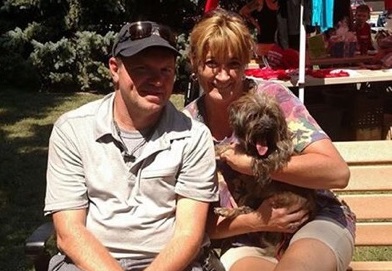 Mahomet residents Dawn Henry and her husband have fostered and rescued dogs for 20 years. Almost a year ago Henry came across a photo of a spunky terrier mix while scanning a rescue’s social media. Maggie’s owners surrendered her to the rescue after the dog’s injury.
Mahomet residents Dawn Henry and her husband have fostered and rescued dogs for 20 years. Almost a year ago Henry came across a photo of a spunky terrier mix while scanning a rescue’s social media. Maggie’s owners surrendered her to the rescue after the dog’s injury.
Paralyzed, the 2-year-old pooch had lost use of her legs. While she had made progress with her front legs, her hind legs lagged and she struggled to control her bowel and bladder.
Henry fell in love but was sure she’d find a home. But when Maggie was still on the rescue’s website months later, Henry felt compelled to meet her and ended up bringing her home.
Carle’s director of Patient Support Services, Henry also oversees the health system’s pet therapy program. Although Maggie still has some trouble walking, use of her hind legs improved under Henry’s care, and Henry expects her little survivor to start visiting patients as a therapy dog soon.
“My hope is that the patients will really be able to connect with Maggie because of their similarities. Both have experienced debilitating injuries and circumstances. But both are working hard to relearn skills like walking and bathroom control,” said Henry, who works daily with the teams that help patients after a stroke, injury or other life-changing medical problem.
 Henry is always looking to add therapy dogs to the current 12 human-canine teams because they provide value to Carle patients.
Henry is always looking to add therapy dogs to the current 12 human-canine teams because they provide value to Carle patients.
- Comfort and calm
- Morale boosts
- Stress relief
- Socialization
“These dogs can change a patient’s mood,” Henry said. “Patients get caught up in the moment with the dog and forget about being in the hospital.”
If you and your therapy dog want to become part of the Carle team, apply through Volunteer Services.
“Community members are a huge part of our pet therapy program,” Henry said. “They volunteer their time to bring their therapy dogs into the hospital, and it makes the patients so happy. This program is so successful because of them.”
Therapy dogs frequent Windsor of Savoy, Mills Breast Cancer Institute and Carle’s Therapy Services/Rehabilitation, Pediatrics and Oncology areas, as well as other floors by request.
Chris Fella of Rantoul loved his experience with Carle therapy dogs. The pups brightened Fella’s spirits during a rough patch in his life.
“I’ve always been an animal lover,” said Fella, who was diagnosed with cancer in 2017. “My dogs are my family. They provide me with my own kind of therapy. Although I couldn’t be with them, the therapy dogs at Carle brought a little bit of home. It was very special.”
Carle created the pet therapy program in 2002.
”Pet therapy has taken the country by storm recently,” Henry said. “Our program has expanded a lot in the past five years. Patients in the hospital can now request a visit from a therapy dog through our iTIGR bedside patient-engagement system, and we’re able to grant most of these requests.”
 While she completed her therapy dog training, Maggie has one more step to becoming a therapy dog at Carle. Carle requires therapy dogs to be nationally certified. Also, Carle staff observe dogs twice in the hospital before they start visiting patients. This ensures the dog is comfortable in the hospital and has the right disposition to work with patients to help them heal.
While she completed her therapy dog training, Maggie has one more step to becoming a therapy dog at Carle. Carle requires therapy dogs to be nationally certified. Also, Carle staff observe dogs twice in the hospital before they start visiting patients. This ensures the dog is comfortable in the hospital and has the right disposition to work with patients to help them heal.
“People of all ages really enjoy seeing these dogs,” Henry said. “They give so much unconditional love.
“I can’t wait for Maggie to join the fleet.”
Categories: Culture of Quality, Community
Tags: Carle, stroke, therapy, dog, volunteer, rehabilitation, neurosciences
